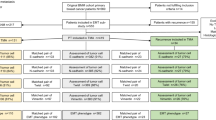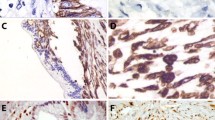Abstract
Background
EMT or transformation to the mesenchymal phenotype plays an important role in tumor invasion and metastasis. In vitro data suggest that mesenchymal transformation may correlate with the activation of PI3 kinase and Ras/Erk pathways. We investigated the expression of EMT markers (low E-cadherin, high fibronectin, and vimentin) and their association with p-Erk in resected pancreatic cancer.
Methods
Clinical data/surgical specimens from 34 consecutive pancreatic cancer patients (pts) who underwent pancreatectomy were included. Immunohistochemical staining was performed on formalin-fixed paraffin-embedded tissues using monoclonal antibodies against vimentin, fibronectin, E-cadherin, and p-Erk. The results were correlated with clinicopathological parameters and survival. Survival analysis (log-rank test, Cox proportional hazard model), categorical data analysis (Pearson’s chi-square, Fisher’s exact test) and Kendall’s tau were performed at a significance level of 0.05.
Results
The patient population was formed from 13 males and 21 females, with a median age of 66 years (range 38–84 years); American Joint Committee on Cancer (AJCC) stage 1 (n = 2), 2 (n = 27), 3 (n = 5); histological grade 1 (n = 4), 2 (n = 13), 3 (n = 16), 4 (n = 1). Median survival was 15 months (95% CI: 11–24 months). Fibronectin overexpression correlated with the presence of vimentin (p = 0.0048) and activated Erk (p = 0.0264). There was a borderline association of fibronectin with worsening grade (p = 0.06). A negative association between vimentin and E-cadherin was noted (p = 0.0024). Increased fibronectin or vimentin and decreased E-cadherin correlated with poor survival.
Conclusion
EMT is associated with poor survival in surgically resected pancreatic adenocarcinoma. A correlation between activated Erk and fibronectin was identified that may open avenues for targeted therapy for this subgroup.







Similar content being viewed by others
REFERENCES
Arias AM. Epithelial mesenchymal interactions in cancer and development. Cell 2001;105(4):425–31
Lee JM, Dedhar S, Kalluri R, Thompson EW. The epithelial-mesenchymal transition: new insights in signaling, development, and disease. J Cell Biol 2006;172(7):973–81
Birchmeier C, Birchmeier W, Brand-Saberi B. Epithelial-mesenchymal transitions in cancer progression. Acta Anat (Basel) 1996;156(3):217–26
Thiery JP. Epithelial-mesenchymal transitions in development and pathologies. Curr Opin Cell Biol 2003;15(6):740–6
Fuchs IB, Lichtenegger W, Buehler H, et al. The prognostic significance of epithelial-mesenchymal transition in breast cancer. Anticancer Res 2002;22(6A):3415–9
Bates RC, Mercurio AM. The epithelial-mesenchymal transition (EMT) and colorectal cancer progression. Cancer Biol Ther 2005;4(4):365–70
Xu J, Wang R, Xie ZH, et al. Prostate cancer metastasis: role of the host microenvironment in promoting epithelial to mesenchymal transition and increased bone and adrenal gland metastasis. Prostate 2006;66(15):1664–73
Yauch RL, Januario T, Eberhard DA, et al. Epithelial versus mesenchymal phenotype determines in vitro sensitivity and predicts clinical activity of erlotinib in lung cancer patients. Clin Cancer Res 2005;11(24 Pt 1):8686–98
Thiery JP, Sleeman JP. Complex networks orchestrate epithelial-mesenchymal transitions. Nat Rev Mol Cell Biol 2006;7(2):131–42
Xie L, Law BK, Chytil AM, Brown KA, Aakre ME, Moses HL. Activation of the Erk pathway is required for TGF-beta1-induced EMT in vitro. Neoplasia 2004;6(5):603–10
Lu Z, Friess H, Graber HU, et al. Presence of two signaling TGF-beta receptors in human pancreatic cancer correlates with advanced tumor stage. Dig Dis Sci 1997;42(10):2054–63
Teraoka H, Sawada T, Yamashita Y, et al. TGF-beta1 promotes liver metastasis of pancreatic cancer by modulating the capacity of cellular invasion. Int J Oncol 2001;19(4):709–15
Chu QD, Khushalani N, Javle MM, Douglass HO, Jr., Gibbs JF. Should adjuvant therapy remain the standard of care for patients with resected adenocarcinoma of the pancreas? Ann Surg Oncol 2003;10(5):539–45
Chadha KS, Khoury T, Yu J, et al. Activated Akt and Erk expression and survival after surgery in pancreatic carcinoma. Ann Surg Oncol 2006; 13(7):933–9
Boucher MJ, Duchesne C, Laine J, Morisset J, Rivard N. cAMP protection of pancreatic cancer cells against apoptosis induced by ERK inhibition. Biochem Biophys Res Commun 2001;285(2):207–16
Gysin S, Lee SH, Dean NM, McMahon M. Pharmacologic inhibition of RAF–>MEK–>ERK signaling elicits pancreatic cancer cell cycle arrest through induced expression of p27Kip1. Cancer Res 2005;65(11):4870–80
Tan X, Egami H, Abe M, Nozawa F, Hirota M, Ogawa M. Involvement of MMP-7 in invasion of pancreatic cancer cells through activation of the EGFR mediated MEK-ERK signal transduction pathway. J Clin Pathol 2005;58(12):1242–8
Wagner M, Redaelli C, Lietz M, Seiler CA, Friess H, Buchler MW. Curative resection is the single most important factor determining outcome in patients with pancreatic adenocarcinoma. Br J Surg 2004;91(5):586–94
Lim JE, Chien MW, Earle CC. Prognostic factors following curative resection for pancreatic adenocarcinoma: a population-based, linked database analysis of 396 patients. Ann Surg 2003;237(1):74–85
Howard TJ, Krug JE, Yu J, et al. A margin-negative R0 resection accomplished with minimal postoperative complications is the surgeon’s contribution to long–term survival in pancreatic cancer. J Gastrointest Surg 2006;10(10):1338–45
Cheng GZ, Chan J, Wang Q, Zhang W, Sun CD, Wang LH. Twist transcriptionally up-regulates AKT2 in breast cancer cells leading to increased migration, invasion, and resistance to paclitaxel. Cancer Res 2007;67(5):1979–87
Vasko V, Espinosa AV, Scouten W, et al. Gene expression and functional evidence of epithelial-to-mesenchymal transition in papillary thyroid carcinoma invasion. Proc Natl Acad Sci USA 2007
Yang MH, Chang SY, Chiou SH, et al. Overexpression of NBS1 induces epithelial-mesenchymal transition and co-expression of NBS1 and Snail predicts metastasis of head and neck cancer. Oncogene 2007;26(10):1459–67
Katoh M. Epithelial-mesenchymal transition in gastric cancer (Review). Int J Oncol 2005;27(6):1677–83
Chaffer CL, Brennan JP, Slavin JL, Blick T, Thompson EW, Williams ED. Mesenchymal-to-epithelial transition facilitates bladder cancer metastasis: role of fibroblast growth factor receptor-2. Cancer Res 2006;66(23):11271–8
Prindull G. Hypothesis: cell plasticity, linking embryonal stem cells to adult stem cell reservoirs and metastatic cancer cells? Exp Hematol 2005;33(7):738–46
Nakajima S, Doi R, Toyoda E, et al. N-Cadherin Expression and Epithelial-Mesenchymal Transition in Pancreatic Carcinoma. Clin Cancer Res 2004;10(12):4125–33
Ellenrieder V, Hendler SF, Boeck W, et al. Transforming growth factor beta1 treatment leads to an epithelial-mesenchymal transdifferentiation of pancreatic cancer cells requiring extracellular signal-regulated kinase 2 activation. Cancer Res 2001;61(10):4222–8
Janda E, Lehmann K, Killisch I, et al. Ras and TGF[beta] cooperatively regulate epithelial cell plasticity and metastasis: dissection of Ras signaling pathways. J Cell Biol 2002;156(2):299–313
Bates RC. Colorectal cancer progression: integrin alphavbeta6 and the epithelial-mesenchymal transition (EMT). Cell Cycle 2005;4(10):1350–2
Korsching E, Packeisen J, Liedtke C, et al. The origin of vimentin expression in invasive breast cancer: epithelial-mesenchymal transition, myoepithelial histogenesis or histogenesis from progenitor cells with bilinear differentiation potential? J Pathol 2005;206(4):451–7
ACKNOWLEDGEMENTS
We would like to acknowledge OSI pharmaceuticals for research support; Donna Olesczek for immunostaining procedures; and Drs. Sreeram Maddipatla,Victor Yosuico and Eiad Nasser for clinical contribution.
Author information
Authors and Affiliations
Corresponding author
Rights and permissions
About this article
Cite this article
Javle, M.M., Gibbs, J.F., Iwata, K.K. et al. Epithelial-Mesenchymal Transition (EMT) and Activated Extracellular Signal-regulated Kinase (p-Erk) in Surgically Resected Pancreatic Cancer. Ann Surg Oncol 14, 3527–3533 (2007). https://doi.org/10.1245/s10434-007-9540-3
Received:
Revised:
Accepted:
Published:
Issue Date:
DOI: https://doi.org/10.1245/s10434-007-9540-3




